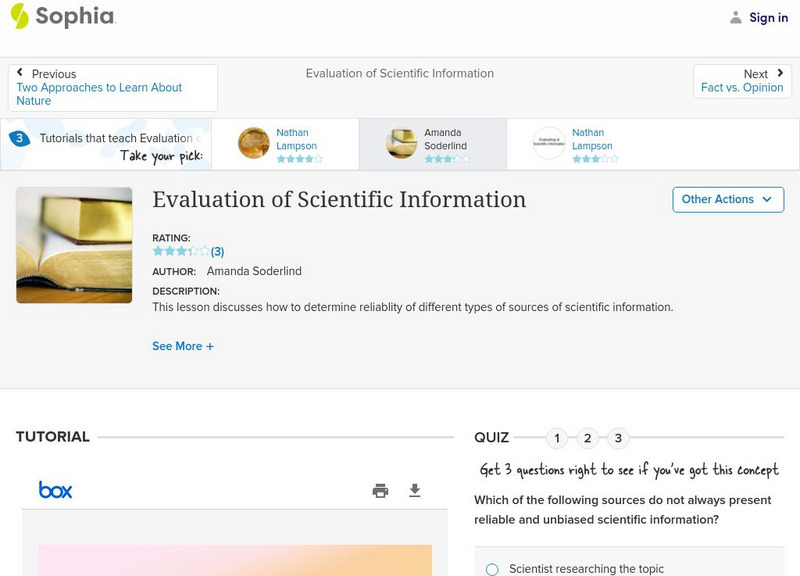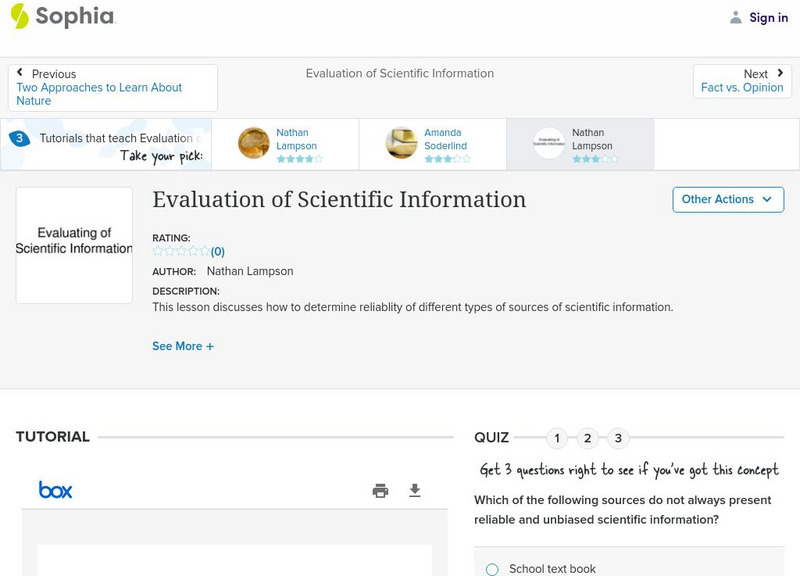Hi, what do you want to do?
Curated OER
Understanding Primary Sources
Young scholars draw conclusions from primary sources and share information and interpretations with a small group. They are introduced to the Jigsaw technique. Students discuss why a grocery receipt would be a primary source. They...
Curated OER
Understanding the Geologic Timescale
Learners identify and analyze how the geologic time scale was developed by investigating 11 periods of time and the vast expanse of time of the Earth's existence. They study their period, determine the important factors indicative to...
Curated OER
What is a Peaceful Classroom?
Students discuss the topic of peace and community. They identify their own examples to support their own idea of peace. They create a list of items that would make their classroom a more peaceful place.
Curated OER
Pair-Share: Constructing Paragraph Order
Students write with controlled and/or subtle organization. They identify the main idea and explicit details. Students analyze paragraph and essay structure. They utilize context clues to identify organization.
Curated OER
Spanish-Speaking Countries
Students explore geographic areas. They list as many countries as possible, divide the countries into groups, and label the groups with logical names. As an introduction into Spanish, students memorize all the Spanish-speaking...
Curated OER
Robert Boyle's Informants
Students review and discuss the importance of Boyle's informants and how he sometimes relied on information from those with experience of the wider world to substantiate his scientific theories. They complete the worksheet, answering...
Curated OER
Arsenic and Human Health
Ninth graders concentrate on arsenic poisoning as an example of the connections among health, geography, and geology as they develop a persuasive presentation about the dangers of arsenic in the drinking water, targeting a specific...
Curated OER
Fungal History
Students identify different types of fungi. They discuss how mushrooms are used in American culture and research an issue about a type of fungi. They share their information with the class.
Curated OER
Data Collection in Archeology
Students become familiar with the fascinating world of Rock Art. They focus on images from SE Utah, this is where the pictures were taken. Students are encouraged to use Power Point and Access file as a guide, they explore the early...
Curated OER
Extreme Weather
Tenth graders explore how to avoid problems that occur during extreme weather and how accidents can be avoided by not taking risks.
Curated OER
100 Years 100 Towns
Students study Saskatchewan's Centennial by researching the history. They determine how the town celebrates the Centennial and write a report about it based on the given rubric..
Curated OER
First Grade American Civilization: February
First graders examine and discuss the Boston Tea Party, Paul Revere, Redcoats, Thomas Jefferson and the Declaration of Independence. They conduct an experiment done by Benjamin Franklin, solve a word puzzle written in code by Ben...
Curated OER
Creating A Family Tree
Fourth graders explore their ancestral background while they experience genealogy.
Curated OER
#1 Fluent Reading: What Does it Sound Like?
Students work on recognizing fluent reading and distinguishing between word recognition and fluency.
Curated OER
Arkansas Black Pioneers: A History of African-American Colonies in Arkansas
Young scholars identify various regions of early Arkansas as these regions relate to African American colonies that settled in Arkansas after the Civil War.
Curated OER
The Medium is the Message: Covering the Final Chapter of the Elian Gonzalez Story
Students discuss the case of Elian Gonzalez and collaborate in small groups to act as editors in assigning facts, quotes, and details to be included in a newspaper article. They judge the accuracy of their predictions.
Curated OER
December Celebrations
Students explore the various ways people in our country and other countries conduct celebrations during the month of December. They research the celebration they've chosen and will present this to the class.
Curated OER
Ed Tech
Students access and evaluate authority of electronic resources. They synthesize data from multiple sources. Students compose a Works Consulted page. They prepare and deliver an informative speech on a disease or medical condition.
Curated OER
Opening Doors to Social Studies with Children's Literature
Fifth graders read a story about immigration, listen to songs about America and explore the history of their ancestors. They discuss how immigration creates a multicultural country. Pupils create a collage of the people in America. ...
Texas Education Agency
Texas Gateway: Differentiate Among Empirical, Anecdotal, and Logical Evidence
[Accessible by TX Educators. Free Registration/Login Required] This lesson will help you distinguish among three kinds of evidence: logical, empirical, and anecdotal; and see how they are used to support conclusions and arguments in texts.
Texas Education Agency
Texas Gateway: Differentiate Among Empirical, Anecdotal, and Logical Evidence
[Accessible by TX Educators. Free Registration/Login Required] In this lesson, students will learn about three types of evidence that writers often rely on: logical, empirical, and anecdotal. It will also help you distinguish among these...
Vocabulary University
My vocabulary.com: Word Roots Lesson 9: Clud Dit Fid: Word Roots #9 Advanced
This lesson plan features the Latin roots CLUD-CLUS-CLOS = close, shut; DIT-DO = give, push; FID = faith, trust. Choose 1 of the 8 different word puzzle activities from the list below.Each word puzzle will have directions, a clue and a...
Sophia Learning
Sophia: Evaluation of Scientific Information: Lesson 2
This lesson discusses how to determine reliablity of different types of sources of scientific information. It is 2 of 3 in the series titled "Evaluation of Scientific Information."
Sophia Learning
Sophia: Evaluation of Scientific Information: Lesson 3
This lesson discusses how to determine reliablity of different types of sources of scientific information. It is 3 of 3 in the series titled "Evaluation of Scientific Information."




























